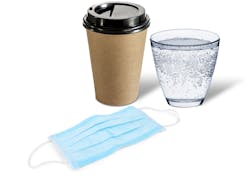As employers across the country are cautiously bringing their employees back into the workplace, operators have an opportunity to recapture lost revenue due to the COVID-19 pandemic. However, operators will need to safely manage their office coffee service (OCS) accounts to keep the confidence of their clients and their clients’ employees. This starts with the proper training of employees, especially those who have client-facing roles.
“We trained all of our employees in our own office break room on what we expect out in the field, and we are constantly checking in with them,” explained Blake Jones, who oversees sales and marketing at Pot O' Gold Coffee Service in the greater Seattle area. “When servicing our customers, we make sure that our employees are equipped with and wearing the necessary PPE products such as gloves, face masks and sanitizer. While at the accounts, our employees make sure they are practicing social distancing while cleaning the equipment and restocking the products.”
Operators can further ease any discomfort their OCS accounts may have by collaborating with their clients to prominently post safety messages in the break room so employees understand how to responsibly enjoy coffee service.
“We have been telling our accounts to make sure they are practicing social distancing in the office and break rooms, and make sure that only one person is using our equipment at a time,” Jones said. “We offer a wide range of cleaning materials, hand sanitizer and PPE products, which we advise that our accounts use throughout their office. Individually wrapped products, such as stir sticks and utensils, are also products that we suggest our customers start to use in their break rooms.”
The coronavirus pandemic has temporarily halted, if not reversed, the trend toward eliminating single-use plastics from the break room. While it may not be the most sustainable choice, single-packaged goods wrapped in plastic give customers a sense of safety.
“For the purpose of safety, people want less bulk and more single-use, so you’re not going to see cream and sugar canisters, you’re going to see single-packaged goods,” explained Mike Coffey, chief strategy and innovation officer at Canteen. “People want wrapped cups and stir sticks. Before COVID, the focus was on sustainability and everybody wanted single-use plastics to go away. But now, because of the unknowns and fears of the virus, everybody wants everything wrapped in plastic.”
However, bulk products can be used safely with some minor adjustments.
“If you do have a bulk program, there are safe solutions out there, including an automatic sensor that detects your cup and dispenses the product,” Coffey explained. “And a lot of manufacturers, even for air pots and coffee dispensing systems, now have push handles that are retrofitted on the canisters in the office coffee spaces.”
While K-cups require that consumers touch the packaging and physically put them in the machine, technology updates on bean-to-cup machines allow for contactless experiences.
“Basically, you scan a QR code and it takes you to a URL through the back end for that machine to let you make the selection on your mobile phone,” Coffey said.
Cafection | Evoca’s Sophia Touch- less Solutions uses IoT technology to give consumers an entirely contactless coffee experience.
“We created Sophia Touchless Solutions to offer a safer alternative to the coffee industry and to the consumers,” said François Baron, CEO of Cafection | Evoca. “The growing demand for cleaner and safer solutions led us to create a contactless ordering technology that can be added on most Cafection brewers equipped with a screen. With Sophia Touchless Solutions, OCS operators are now able to offer a secure coffee environment to their customers.”
In most cases, OCS operators can enable touchless ordering through a simple software upgrade that takes less than 15 minutes, Baron added.
Equipment manufacturers are offering contactless solutions for workplace beverage options beyond coffee. PepsiCo recently announced the fall launch of the SodaStream Professional, an eco-friendly, mobile-enabled beverage dispenser that allows users to personalize flavors, carbonation levels and temperatures through the SodaStream Connect mobile app. Users can digitally track their water consumption, save their favorite drink combinations and see how many plastic bottles they’ve saved by using the SodaStream Professional instead of bottled water.
“As businesses reopen, many are thinking about the connection between people health and planet health,” explained Aziel Rivers, senior director of innovation, PepsiCo Global Foodservice. “It’s a unique challenge for operators who want to offer variety to guests without taking away the ease and personalization of self-serve equipment. That’s what makes SodaStream Professional an ideal option for operators in a post-COVID-19 world. SodaStream Professional reimagines the typical water dispenser to offer a totally customized experience through its digital inter- face and connected mobile app.”
Rivers said that the SodaStream Professional allows users to personalize their beverage with more than 100 flavor combinations, all through a virtually contactless experience.
“Using their smartphones, people can save their perfect drink and fill up their reusable water bottle with just one tap,” he added. “Reusable water bottles can use a specially designated QR code to recognize your favorite selection and history. For those who choose not to use the app, SodaStream Professional requires just a few quick on-screen selections and a designated dispense area so people can fill up their bottles without touching the spigot.”
Jones said that Pot O’ Gold is currently using touchless solutions for its OCS accounts, and he’s keeping an eye on new technologies in this space.
“We are well-equipped and currently have a number of machines in our office set up with touchless features — this is definitely going to be a turning point in our industry that we are ready and excited for,” Jones said. “As soon as we were made aware of manufacturers developing these machines, we advertised it to our customers and have received a lot of interest and great feedback.”
While most OCS operators experienced declines due to clients’ employees working from home during the COVID crisis, there is a belief that as long as people come to the workplace, they are going to expect to have access to coffee.
“Coffee in this space is going to be different, but we know it’s a necessity,” Coffey said. “People want coffee.”
About the Author

Abby White
Abby White previously served as chief editor for Automatic Merchandiser and VendingMarketWatch.com.
To reach the current editor of Automatic Merchandiser and VendingMarketWatch.com, email [email protected].
